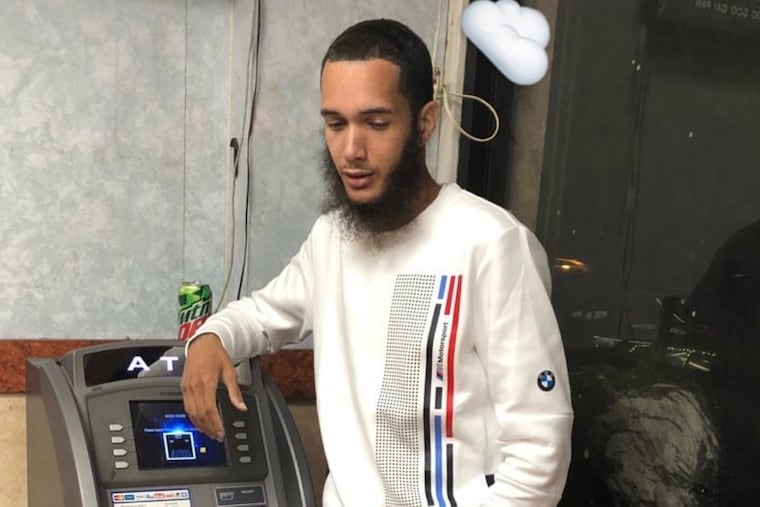A Philly hit man pleaded guilty to taking part in four murders in less than a year
Steven Williams' crime spree makes him a uniquely violent figure in recent Philadelphia history.

Steven Williams doesn’t look the part of a contract killer.
The 30-year-old West Oak Lane man is soft-spoken and slight of frame with a shaggy beard — hardly the typical portrait of a cunning and ruthless hit man.
But on Tuesday, Williams admitted to a crime spree that makes him a uniquely violent figure in recent Philadelphia history: He pleaded guilty to participating in four murders across the city in less than a year — crimes prosecutors said he carried out for others.
And all to line his own pockets.
He sent boastful messages after some of the killings, investigators said, including, in one instance, telling another suspected hit man that he had a “mini graveyard” of his own.
Williams’ victims had no obvious links to one another, and even as he admitted his guilt Tuesday, prosecutors remained relatively tight-lipped about some aspects of the case, including who may have hired Williams, or why they wanted their targets dead.
In one of the killings, Chief Deputy Attorney General Tracie Gaydos said Williams lent his car to two other triggermen — who then shot the wrong person.
In others, Gaydos said, investigators found evidence including surveillance video, cell-phone records, and witness testimony that showed Williams — whose nickname was “White Boy” — was clearly the shooter. But she declined to elaborate on potential links between the crimes, or their motives.
Williams, for his part, said little while entering his plea before Common Pleas Court Judge Rose Marie DeFino-Nastasi. He almost didn’t go through with it — initially indicating he was prepared to take the case to trial.
When DeFino-Nastasi told him that doing so could expose him to at least one life sentence, however, he changed his mind.
“Guilty,” he repeated as charges against him were read aloud. Prosecutors agreed to allow Williams to plead guilty to three counts of third-degree murder, one count of conspiracy to commit murder, and gun charges. They also said they would not seek the otherwise-mandatory life sentence for people who are twice convicted of third-degree murder.
DeFino-Nastasi will determine his sentence at a hearing in March.
In admitting to his crime spree, Williams joins other gunmen convicted of a string of unrelated and separate slayings in Philadelphia. Ameen Hurst pleaded guilty in November to committing four killings, some of which targeted people he viewed as enemies in a back-and-forth gang war.
Michael Blackston was charged in 2019 with committing six killings over several years for a violent drug organization. He’s serving a life sentence for one conviction, but has had mixed verdicts in his other cases as they’ve wound through the courts, and some cases against him remain pending.
Prosecutors said Williams’ streak of violence began on Sept. 8, 2018, when he shot and killed 35-year-old William Crawford outside Crawford’s home on the 1900 block of Hartel Avenue in Rhawnhurst.
Two witnesses later provided descriptions of a shooter who looked like Williams. And another told police that a man known as “White Boy” was rumored to have been Crawford’s killer.
Cell-phone records later showed Williams had been on Crawford’s block at the time of the murder. Not long afterward, court records say, Williams sent another suspected contract killer the message about having his own graveyard.
In the months after the crime, Crawford’s father, Stanley, became a relentless advocate for justice. He founded the Families of Unsolved Murders Project, an organization that seeks to bring attention to cold cases. And he tried to round up leads or tips on the street about what may have happened to his son so that he could provide the information to police.
The elder Crawford said in a recent interview that he’s still not certain who wanted his son dead or why. But he believes Williams may have provoked the homicide by approaching drug dealers in search of a payday.
“If you’re a contract killer, you need somebody to kill,” Crawford said. “You’ve got to figure out who you can get to pay you to kill somebody.”
The second murder Williams admitted his role in occurred on Feb. 10, 2019. Jermaine Simmons was sitting inside his car in front of his house on the 7500 block of Forrest Avenue when a black Lexus pulled alongside and two people within opened fire.
Gaydos said in court that investigators do not believe Williams was the triggerman, but he lent his car to two gunmen who shot Simmons, 29, in a case of mistaken identity. (Williams pleaded guilty to a count of conspiracy to commit murder in that case).
A month after that crime, in March 2019, Williams shot Richard Isaac in the head and chest as he sat on a front porch in the 100 block of Meehan Street in East Mount Airy. Forensic tests later showed that Williams used the same gun in that killing and Crawford’s murder, Gaydos said.
And later that spring, in May 2019, Williams fatally shot 46-year-old Leslie Carroll, who was sitting in a car on the 2000 block of West Girard Avenue.
Williams was captured on surveillance video driving his car behind Carroll’s for several blocks before pulling alongside Carroll’s sedan and opening fire, Gaydos said. And text messages later revealed that Williams sent photos and videos of Carroll to someone else — Gaydos didn’t say who — in the moments around the killing.
Williams displayed no emotion and expressed no remorse during the hearing, and his attorney, Richard Giuliani, declined to comment afterward.
The elder Crawford, meanwhile, said he was relieved that Williams finally admitted to his crimes — actions that devastated him and dozens of friends and relatives of the other victims.
“It’s been a six year journey of uncertainty,” Crawford said. “I believe it’s coming to the point where we can get some closure.”